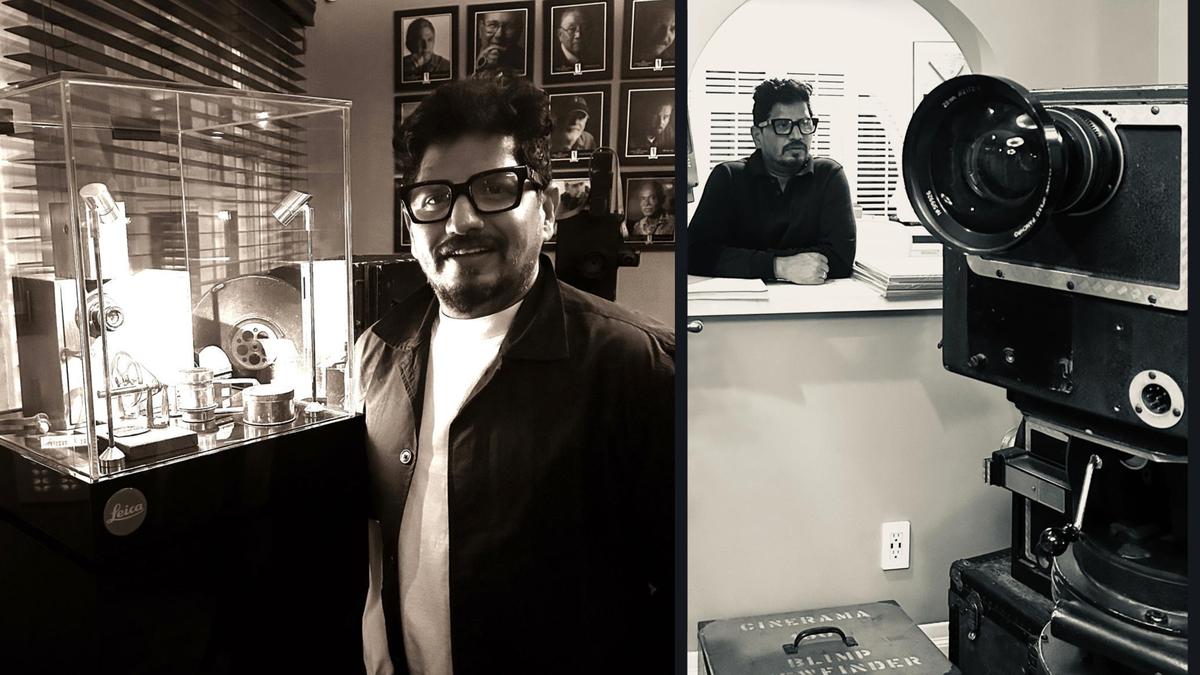
Ravi Varman interview: On being inducted into the ASC, and his ever-growing fascination for natural light
The Hindu
Cinematographer-filmmaker Ravi Varman says that he hopes his story will inspire younger generations to go after their dreams
Inside the iconic AVM Studios in Chennai stands an erected stage buzzing with activity. A scene for Love Insurance Kompany is being filmed, and art designers have put together a one-of-a-kind futuristic domicile. Director Vignesh Shivan is occupied, guiding the leading lady, Krithi Shetty, through every step of the scene. As the entire set is busy assembling the many things that go into making a shot, you can see ace cinematographer-filmmaker Ravi Varman orchestrating his team of cameramen with a zen-like focus. While the hundreds around him leave a thousand footprints every hour, Ravi exudes the stillness of a veteran martial arts guru; seated inside the structure, he gets the job done with minimal fuss. You almost miss his presence on the set, and it seems like Ravi’s reticence with the limelight even extends to his workplace.
Fame sits lightly on his frame. Even giving interviews, he believes, is self-exalting, and pointless in a world so consumed by pride. “Because what do I talk about? There’s so much negativity around us, and people have become quite self-oriented. So one doesn’t feel like talking much anymore.” When I remind him of the applause he got at the 55th International Film Festival of India in Goa — during a talk featuring Mani Ratnam and Gautham Vasudev Menon — he seems irked by the memory. “I never feel like I am famous. I just wanted to be there (IFFI) as an audience. When Mani sir talks, I feel positive. I have never seen him talk ill about another person or a film. So, when he was addressing a public gathering, I was curious about what he would talk about. I didn’t want to disturb him, so I was a bit taken aback by that (applause),” he says.
This week, however, Ravi must endure the limelight shining bright on him. Just days ago, the American Society of Cinematographers (ASC), the world’s leading cinematographers’ organisation housing the greatest of greats in the field, announced Ravi’s induction as a member.
You find a sense of validation when he explains how an induction into the ASC happens purely due to the merit of one’s body of work. “ASC is an exclusive organisation to which one cannot just apply and join; they need to invite you after seeing your work.” He ponders, how while all that fell into place in his career might have even been accidental, this honour is something he had always dreamt of and manifested. “It feels nice to be among the world-renowned cinematographers.”
Meeting fellow members at the organisation changed something in Ravi. “It was a pleasant surprise to know that some of them were already familiar with my work. Some even asked, ‘Were you the one who did Barfi?’ ‘Did you do Ram-Leela?’ ‘You shot Tamasha also? So it was you behind all of these images?’ That’s when I thought I had to be more humane, and help others in whatever capacity I could. I kept thinking about how such greats humbly encouraged someone like myself,” he explains.
An induction into ASC opens international avenues, but Ravi, once again, asserts that he doesn’t want to make this about himself. “I want this to inspire the younger generation of people. They should know that, no matter where you come from, you can achieve your dreams through hard work, dedication and passion for the craft.”
What better role model could young aspiring filmmakers ask for? Ravi’s story is a beacon of light that has inspired countless; it’s an empowering story of resilience, of how a battered young boy, traumatised by the death of his mother and a crooked system that neglects tender souls, shaped his own destiny by choosing light, literally and metaphorically. Now that he has ascended to such heights, does he wonder how his mother would have felt had she been alive? “Maybe I wouldn’t have entered the field if my mother was still alive. I would have still been in my village, probably finished my education, and taken a job. Or I would have been a good farmer,” he ruminates.

 Run 3 Space | Play Space Running Game
Run 3 Space | Play Space Running Game
 Traffic Jam 3D | Online Racing Game
Traffic Jam 3D | Online Racing Game
 Duck Hunt | Play Old Classic Game
Duck Hunt | Play Old Classic Game

